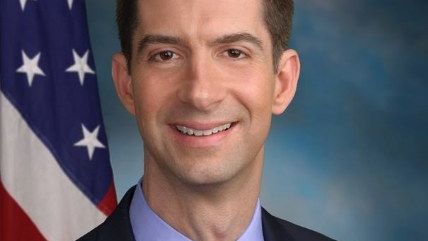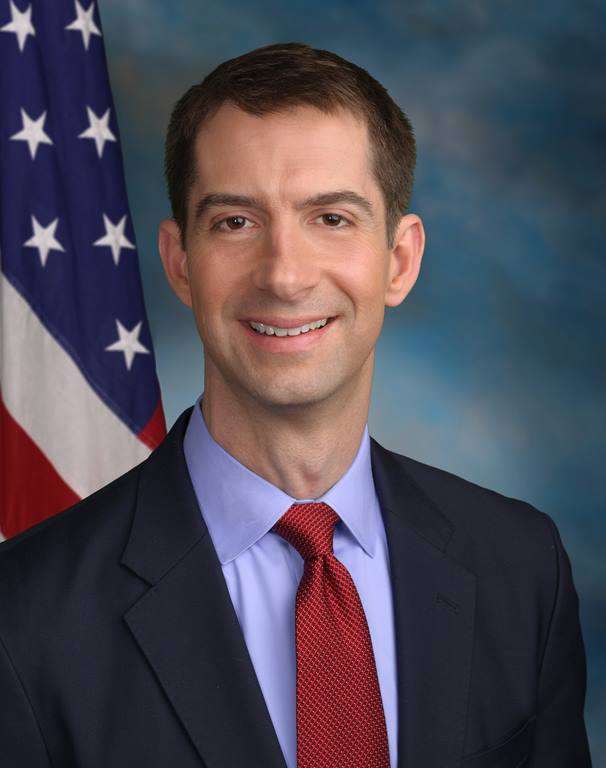The Fiction That Drug Trafficking Is 'Inherently Violent' Could Harm Sentencing Reform
Watered down improvements to federal mandatory minimums may get watered down further.


Abusing the word "violent": It's not just for outraged college students trying to fabricate harms in order to shut down speech they don't like.
Republican Sen. Tom Cotton of Arkansas is abusing the word "violent" to attack the bipartisan Sentencing Reform and Corrections Act, which would reduce mandatory minimum sentences (in some cases retroactively) for a host of drug-related crimes. Cotton is claiming the bill will, as it stands, would "lead to the release of thousands of violent felons." His claim is not really true, but his argument seems to have traction. As Brian Doherty noted yesterday, the legislation may see cuts in a couple of areas connected to whether a criminal had a weapon during a drug offense or after having three drug or violent crime arrests.
What makes Cotton's claim ring false? Cotton believes that drug trafficking is inherently a violent crime, and as the Washington Post notes, pretty much sees everybody potentially released by the legislation as violent criminals. Caroline Rabbitt, Cotton's spokesperson told the Post, "It is naive to think that dealing cocaine and taking part in its import and distribution is 'nonviolent.' That's a fantasy created by the bill's supporters and no serious federal law enforcement expert would agree with it."
Ah, but they do. In fact more than 130 "law enforcement experts" do. Republican Sens. Mike Lee (Utah) and Chuck Grassley (Iowa), who have hammered out this legislation, have distributed letters signed by dozens of current and former police chiefs, sheriffs, district attorneys and others supporting the Sentencing Reform and Corrections Act. Lee and Grassley will be holding a briefing this afternoon to discuss the support of the law.
Cotton's suggestion that the reforms will result in dumping criminals out into the street is not to be treated seriously. The law does indeed reduce mandatory minimums retroactively, but it's not automatic. Prosecutors can resist and a judge would make the call based on the circumstances of each case. Molly Gill, government affairs counsel for Families Against Mandatory Minimums (FAMM) notes that the impact of the bill would actually be fairly small as it stands, given the number of people in federal prison.
"We're talking about 2,300 people over a period of several years, and not all those people would get reductions," Gill says, of those who would be affected by the parts of the act that may get dropped.
She also objects to the idea that all drug traffickers are "violent."
"I would say that I think his view is a minority a view," she says. "It's definitely not the view of 80 percent of the voters who think we should be eliminating mandatory minimums for drug offenders." It's also not an accurate analysis of who is serving federal time for drug crimes. According to a congressionally funded task force report (from the Charles Colson Task Force), almost half the people in prison for drug crimes have few if any prior convictions. A quarter have no criminal history at all. Fewer than 25 percent were sentenced for having or using a weapon for a crime.
As it stands, the Sentencing Reform and Corrections Act is itself a compromise from the Smarter Sentencing Act Lee had proposed, Gill notes. The Smarter Sentencing Act would have reduced mandatory minimums and changed sentences for almost all drug cases, affecting tens of thousands of people a year. This act now being considered is much more limited, at Grassley's demand.
But if you think all drug crimes are "violent," would you get on board for any sentencing reforms at all? Dara Lind at Vox wonders if it's even possible to get Cotton to support any sort reduction in mandatory minimums given the language he's using:
If you believe that every drug dealer is violent, then you're not going to get on board with a bill reducing mandatory minimum sentences for drug crimes. You're not going to get on board with a bill that allows some drug offenders currently in prison to take classes and get jobs in exchange for "good time" credits. In short, you're not going to support the Senate bill, because that's what the Senate bill does.
The fact that a judge would actually be in the position to decide whether or not an offender represents a threat apparently doesn't matter (because, Cotton complains, so many of the courts are filled with "liberal Obama judges").
I contacted Lee's office for a reaction, and he provided a prepared statement: "We're working to find a path forward that addresses some of the criticisms while at the same time maintaining both the core principles and significance of the bill and the broad bipartisan support that the bill has already garnered." Grassley and Sen. Dick Durbin (D-Ill.), the sentencing act's other sponsor, have put out statements that say the same.
Editor's Note: As of February 29, 2024, commenting privileges on reason.com posts are limited to Reason Plus subscribers. Past commenters are grandfathered in for a temporary period. Subscribe here to preserve your ability to comment. Your Reason Plus subscription also gives you an ad-free version of reason.com, along with full access to the digital edition and archives of Reason magazine. We request that comments be civil and on-topic. We do not moderate or assume any responsibility for comments, which are owned by the readers who post them. Comments do not represent the views of reason.com or Reason Foundation. We reserve the right to delete any comment and ban commenters for any reason at any time. Comments may only be edited within 5 minutes of posting. Report abuses.
Please to post comments


Trchnically, any commerce outside the boundary of laws is inherently more violent* than commerce within the bounds of law.
*As long as violence done by state agents is neglected. Try ignoring the IRS or state inspectors and see if someone doesn't seize your property and money at gunpoint.
Without courts available to settle disputes peacefully, they are often settled with violence. But that doesn't mean everyone involved in the drug trade actually does so.
Oh yeah? Well no true law enforcement expert would agree.
It's settled law enforcement science.
Arkansas is the shit Missouri is constantly trying to scrape from the heel.
You really didn't expect the whole drug war industrial complex to just quietly admit defeat, did you? They will fight us every step of the way. Arguments about human misery fall upon deaf ears; they've been ramping up the misery for decades, they aren't going to have an eleventh-hour change of heart.
They've already started warming up human trafficking as the next big thing, just in case. And heck, maybe they can get some separate funding for it *and* keep the drug war going. A prohibitionist's wet dream.
If they weren't violent, why would we have them incarcerated?
I don't think Cotton ever found a punishment too harsh. He's got a raging boner for authoritarianism.
All I could hear while reading this was Tom Cotton opening his mouth and Sly Stallone's voice saying "I AM the law."
All i can hear when I look at his picture is him singing "It's Howdy Doody time."
This only further reinforces my fear of puppets.
You know what is inherently violent? Being a senator.
Drug trafficking is violent? Wierd, I've never seen two beer suppliers shooting it out in the street.
That's because you weren't around in the 1920's.
No I wasn't. It's violent when it's illegal was kind of my point.
Its only "violent" because it is illegal. Whatever you think of drugs, they are still just a product people sell. Is there something inherently violent about selling anything else?
This is fucking idiotic and another sad example of how this country is becoming more and more primitive. Words have meanings and those meanings have some connection to reality. Violence is a word and it means something. The more we pretend it doesn't, the more primitive and detached from reality we will become.
And even then it's not inherently violent. Drug traffickers subject to federal punishment include plenty of people just trying to move some pounds of weed across the country who have never considered a violent act in their life. They want us to believe that "drug traffickers" only means violent gangsters. Lots of drug traffickers are violent gangsters, but lots aren't.
Alt text wins, because it is probably true, and sad, and made me think of that heavily be-jowled prick.
I think Cotton does have a point, only insofar as it is probably true that a substantial number of those sentences to federal prison for drug crimes were involved in violence. Of course not all, and for all know, not even a majority.
But he completely misses the point, as many others have so ably pointed out here, that because it is illegal, it encourages violent behavior. He, like other drug warriors, engage in what Thomas Sowell calls Stage 1 thinking. The left lives on this type of thinking, but the right has its blind spots as well.
Basically, drugs are bad, so lets ban drugs.
No he doesn't. He also sucks.
It is possible that a number of individuals who committed violent crimes were only tried and convicted of drug and incidental offenses (e.g. having a gun when arrested).
However, that is an indictment of our prosecutorial system and should not be used as an excuse to hold people in prison longer who have not been convicted of violent crimes.
How drive by shoorings were done by liquor companies last year?
How about during prohibition?
Even if you think drug offenses are innately violent it doesn't follow that they should result in the kind of sentences you get.
If I punched someone in the face, that's objectively violent, but I'd get a much lighter sentence than most drug dealers. Hence, even assuming it's violent Cotton's point in no way contradicts the idea that we should have lighter (or nonexistent) mandatory minimums.
When alcohol was Prohibited, armed gangs fought over the lucrative illicit alcohol business with Tommy guns and drive by shootings. Now that alcohol is no longer Prohibited, Budweiser and Coors fight over the licit business with tacky TV commercials.
Drugs are still Prohibited, so armed gangs fight over the lucrative illicit drug business with automatic weapons and drive by shootings. I'm not sure why people can't see it's the same exact thing.
Do we have to bring back to shootings to get rid of the commercials?
The technology is so developed that we can watch videos, live streaming, TV serials and any of our missed programs within our mobiles and PCs. Showbox
All we need is a mobile or PC with a very good internet connection. There are many applications by which we can enjoy videos, our missed programs, live streaming etc.